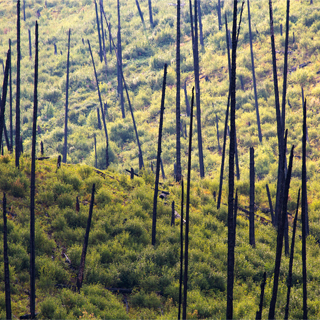Request for Proposals
UM IoE Graduate Student Fellowship Awards
-

2024 UM IoE Graduate Student Fellowship
January 30, 2024
UM IoE Director, Dr. Frank Rosenzweig requests proposals for the 2024 UM IoE Dissertation Improvement Grants. The fellowship awards are open to UM PhD candidates whose research aligns with themes relevant to the UM Institute on Ecosystems.
Amount: $2,500
Source: University of Montana Institute on Ecosystems
Awards: Up to three fellowships for Summer 2024
Eligibility: PhD candidates whose research aligns with themes relevant to the UM Institute on Ecosystems, such as (i) ecosystem studies; (ii) population, community, and landscape ecology; (iii) ecological and evolutionary genetics
Deadline: Tuesday, March 26, 2024 at 5:00 PM MDT
Doctoral students who meet the eligibility criteria can apply for a fellowship to support summer research and travel expenses that facilitate the completion of their Ph.D., increase their competitiveness for post-doctoral applications and federal grants, and contribute to peer-reviewed publications. Applications will be evaluated based on scientific merit, academic record, and likelihood of the candidate achieving their project goals.
To apply, students must submit a proposal that meets the requirements below. Applications will be reviewed by the IoE Fellowship Committee chaired by Director Frank Rosenzweig. All application materials should be sent directly to Jamie Lockman (jamie.lockman@umontana.edu) no later than March 26, 2024, at 5:00 PM MDT.
Application Requirements:
A two-page, single-spaced (800-word limit) proposal that outlines (i) the current status of the student applicant’s dissertation, (ii) overarching research goals, and (iii) the role that this award would play in advancing the completion/dissemination of that research. Please include a title and abstract not exceeding 100 words. The proposal should include a timeline for completing all portions of the proposed research. Anticipated conference presentations and/or publications should be included separately as an Appendix. The abstract and appendix do not count toward the 800-word limit.
A Curriculum Vitae (CV) that summarizes the student applicant’s educational background and academic achievements, including undergraduate and graduate GPAs, advanced coursework and/or workshops, presentations, published abstracts, and peer-reviewed publications, plus any other information that contributes to the applicant’s merit.
A letter of support from the dissertation advisor attesting to the quality, significance, and probable impact on the field of the candidate’s work, as well as to the student applicant’s capacity to complete their Ph.D. The letter should indicate the student’s career stage (e.g., 2nd-year student, Ph.D. candidate) and their anticipated defense date by semester/year.
Fellowship Awardees Must:
Register for a dissertation boot camp with the UM Writing and Public Speaking Center or an equivalent professional development opportunity dedicated to excellence in science communication.
Offer a public seminar during the 2024-25 academic year to the University of Montana graduate community through existing venues such as departmental or graduate group seminars. Candidates must explicitly highlight progress facilitated by the IoE award.
Acknowledge IoE support appropriately in oral and poster presentations and in peer-reviewed research publications.
Evaluation Criteria:
1) Quality and impact of research project.
2) Potential impact of funding on dissertation completion.
3) Quality, clarity, and detail of the proposal, including execution details (timeline, specificity of remaining work, etc.)
4) Quality and impact of prior research activities.
Contact: Jamie Lockman, (406) 243-5515 or jamie.lockman@umontana.edu
2023 UM IoE Graduate Student Fellowship Awards
-

Heidi Abresch
"Genome Evolution and Transmission of an Emerging Nitrogen-Fixing Organelle"
Abstract: Tight-knit endosymbiotic relationships are integrated across genetic, metabolic, and cellular levels. To understand the mechanisms driving this integration, I study diatoms in the family Rhopalodiaceae, which have nitrogen-fixing cyanobacterial endosymbionts called spheroid bodies (SBs). Here, I focus on sequencing a wide range of SB and host genomes to understand SB genetic and metabolic capacity and test for strict vertical inheritance of SBs.
Program of Study: Ecology and Evolution; Advisor: Dr. Scott Miller; Thesis Topic: Integration and Coevolution of a Nitrogen-Fixing Endosymbiont in the Diatom Family Rhopalodiaceae; Expected Graduation Spring 2026. Visit Abresch's website to learn more about her work with diatoms, microbial ecology, and "evolutionary gray areas."
-

Mark Kreider
"Post-fire climate impacts on long-term forest development"
Abstract: Increasing high-severity fire and hot, dry climate in the western U.S. are prompting concern whether reduced post-fire tree regeneration will cause permanent ecosystem shifts to non-forest. Using a fire-prone Northern Rockies wilderness area, I am investigating how post-fire climate (0-5 years) influences long-term forest development (80+ years). This work extends timescales of existing research, helping us understand how climate change may impact western U.S. forests.
Program of Study: Forest & Conservation Sciences; Advisor: Dr. Andrew J. Larson; Thesis Topic: Post-fire climate impacts on long-term forest development; Expected Graduation Spring 2024. In addition to his work in ecology and conservation, Kreider is also an accomplished photographer and musician. View samples of his photographic work on his website.
-

Ryan Schroeder
"Rangeland soil seed bank dynamics: Understanding how soil properties and land management strategies influence seed bank suitability and pathways for ecosystem restoration"
Abstract: Soil seedbanks – the living seeds in the soil profile and on the soil surface – are important components of rangeland community ecology and assembly. Understanding seed-soil-plant relationships and interactions with ecological restoration treatments can help predict ecosystem vegetation trajectories to help invest resources strategically into rangelands for their restoration and conservation.
Program of Study: Systems Ecology; Advisor: Dr. Akasha Faist; Thesis Topic: Rangeland soil seed bank dynamics: Understanding how soil properties and land management strategies influence seed bank suitability and pathways for ecosystem restoration; Expected Graduation December 2024.
